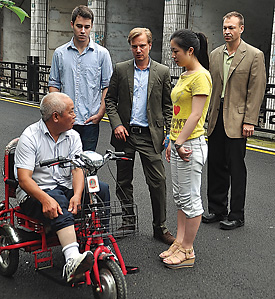Undergraduate research has opened doors at the university and globally for Josh Verson.
As one of many students involved in the Undergraduate Research Opportunity Program, the 21-year-old junior neuroscience (pre-med) major from Deerfield, Ill., has been assisting Andrew Haig, a professor of physical medicine and rehabilitation, with his medical research.

From left, UROP student Josh Verson, Dr. Jan Reinhardt of the Switzerland Paraplegic Center, interpreter Hua-Cong Wen and Dr. Jim Gosney chat with an elderly man who had been paralyzed from the hips down in the Sichuan earthquake. Photo by Courtesy Josh Verson.
The two collaborated on a project that has Verson interviewing — through a translator — amputees and patients with spinal cord or traumatic brain injuries who were severely hurt in the devastating 2008 earthquake in China’s Sichuan province. Medical relief in the rural region was sparse and many people died due to inadequate emergency care and resources, he said.
“Without UROP as a starting point, none of this would be possible, and all the work going into helping the world during future natural disasters would not be moving at such a fast speed,” said Verson, who has met doctors, nurses, health officials and policy makers to understand every aspect of the Sichuan response.
It’s this “discover the world of research” format that has made UROP a longtime fixture at the university. For 25 years, the program has inspired students to work with faculty, postdoctoral fellows, graduate students and research scientists from all U-M schools and colleges.
The program, which began in the late 1980s with 14 student-faculty partnerships, had been created to increase retention and improve the academic performance of underrepresented minority students. Today, based on the impact of exposing students to research early in their academic careers, it’s available to all students.
UROP targets freshmen and sophomores. Five years ago, the program was opened to transfer students with an emphasis on those from community colleges.
Today, more than 1,300 students and 700 faculty researchers participate in UROP, which is supported by the General Fund and private individuals and foundations. U.S. News & World Report has ranked it among the top programs.
To celebrate its silver anniversary, officials will conduct a series of special events beginning with this year’s UROP Spring Research Symposium and going through the fall with a special symposium about the Role of Undergraduate Research in Ensuring Access and Equity in Higher Education. Also planned are alumni panels and reunions, culminating with a final celebration at next spring’s symposium.
The Spring Research Symposium, which is free and open to the public, runs from 10 a.m.-6 p.m. April 24 and will feature oral presentations and poster sessions in the Michigan League.
UROP Director Sandra Gregerman said studies indicate UROP students are more likely to graduate, perform better academically, and attend graduate and professional school in greater numbers than students who do not have a research experience.
Once students have applied and been admitted into UROP they can access hundreds of projects from many disciplines.
“Students are encouraged to look broadly for projects and to keep an open mind when perusing the project listings,” she said. “We hope students will find fields they didn’t even know existed and a passion for learning and engagement throughout their undergraduate careers and beyond.”
Students, who can participate in UROP during the fall/winter term or summer program, bring “a certain energy and enthusiasm to a research project,” said David Harding, associate professor of sociology and public policy.
“In addition, working with undergraduates forces you to think about how to communicate your research to a wider audience and make it relevant to the broader public,” said Harding, who received the program’s outstanding research mentorship award in 2007.
Renee Rienecke Hoste, director of clinical services and research at the Comprehensive Eating Disorders Program, participated in UROP before graduating in 1997 with a bachelor’s degree in psychology. She now works with UROP student Rebekah Richmond to develop the research infrastructure for the new program -— something she never expected during her many hours researching eating disorders under the guidance of former faculty member Suzanne Fechner-Bates.
“Being on the other side of the UROP experience feels like things have really come full circle,” she said.
UROP alumnus Daren Hubbard participated in the program as a sophomore, digitizing photographic slides and creating a computer-based training module for art history students in 1991. A 1994 U-M graduate with a bachelor’s degree in political science, he is the senior director of enterprise applications for the Computing and Information Technology Division at Wayne State University.
“UROP altered the trajectory of my life,” he said. “In addition to being exposed to technology in an exciting way, I had the privilege of working for the program as a junior and senior and then for five years after graduation. I was able to develop excellent administrative and leadership skills that continue to pay dividends.”
Verson also noted the leadership skills gained through UROP. The researchers plan to create a Web-based medical certification program for doctors to assist natural disaster emergency teams worldwide. This summer, he will present their work at the international rehabilitation conference in Beijing.
Located in the Undergraduate Science Building, UROP is accepting applications for the 2013-14 school year. For more information, go to www.lsa.umich.edu/urop.

